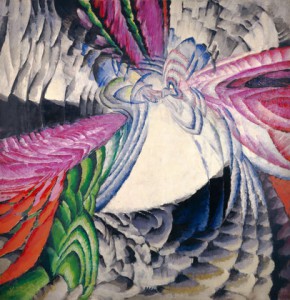
František Kupka
Localization of Graphic Motifs II
For those of you who think that Abstract painters are taking the easy way out compared to figurative artists (the “my kid could have made this painting” school of thought), I have one piece of advice: try it. Try to create the illusion of space without reference to nature. Or harder, try not to create space at all. Try to make compositions that engross and delight and perplex without including nudes or flowers. Paint polka-dots without accidentally turning them into tablecloths. It’s really difficult. I know – I keep trying.
The current MoMA show Inventing Abstraction is an encompassing look at the origins of abstract art. For a complete rave review, read Roberta Smith in the New York Times:
I’m only disappointed that the show doesn’t discuss why individual artists across Europe and Asia suddenly began abstracting their paintings in 1910. This is as revolutionary as Isaac Newton and Gottfried Leibniz inventing the calculus separately at the same time. Where did abstraction come from? What caused men and women to abandon figuration in favor of something so incredibly new? (And I don’t include Cubism in the new. Cave paintings are cubist. They came from the natural instinct to depict objects as we know them instead of as we see them. Ask any six-year-old artist who puts 4 legs on every dog, no matter his point of view.)
I’ve always assumed abstraction came from the wave of revolutions that swept through Europe, but those were mid-19th century. Surely the artistic response would not have taken 60 years. And I’d like to blame the Russian Revolution and World War I for giving artists a new and bleak view of the fracturing of the world. But those occurred several years after the beginnings of abstraction. I’ve been told that it was our ability to see the world from the sky: hot air balloons and the Eiffel Tower. But they also predate the paintings by a wide margin. Some people say that abstraction was a reaction against photography, but again the timeline doesn’t work.
Perhaps it was the intellectual building-up of what turned into the first World War. Perhaps it was artists seeing the world around them as out-of-sync with their experiences of inequality, and the growing feeling of monarchy as archaic. Perhaps abstract art was not the result of World War I, but a reflection of what caused it. Maybe abstract art made revolution possible.
Paul Klee may have had it right (in part) when he wrote in 1915, “The more horrifying this world becomes, the more art becomes abstract; while a world at peace produces realistic art.” What do you think?
I think you (and Klee) are absolutely right. And I also think it’s possible that sometimes the world reflects art and not just the other way around.